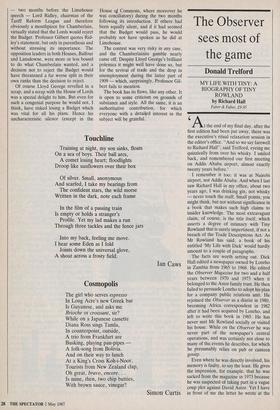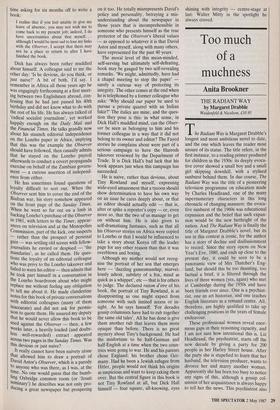The Observer sees most of the game
Donald Trelford
MY LIFE WITH TINY: A BIOGRAPHY OF TINY ROWLAND by Richard Hall Faber & Faber, f9.95 At the end of my final day, after the first edition had been put away, there was the executive's ritual relaxation session in the editor's office. "And so we say farewell to Richard Hall", said Trelford, eyeing me quizzically from over his whisky. I smiled back, and remembered our first meeting on Addis Ababa airport, almost exactly twenty years before.'
I remember it too: it was at Nairobi airport, not Addis Ababa. And when I last saw Richard Hall in my office, about two years ago, I was drinking gin, not whisky — never touch the stuff. Small points, you might think, but not without significance in a book that makes such high claims to insider knowledge. The most extravagant claim, of course, is the title itself, which asserts a degree of intimacy with Tiny Rowland that is surely impertinent, if not a breach of the Trade Descriptions Act. As Mr Rowland has said, a book of his entitled 'My Life with Dick' would hardly amount to a couple of paragraphs.
The facts are worth setting out. Dick Hall edited a newspaper owned by Lonrho in Zambia from 1965 to 1968. He. edited the Observer Magazine for two and a half years between 1970 and 1973 when it belonged to the Astor family trust. He then failed to persuade Lonrho to adopt his plan for a company public relations unit. He rejoined the Observer as a diarist in 1980, becoming Africa correspondent in 1982 after it had been acquired by Lonrho, and left to write this book in 1985. He has never met Mr Rowland socially or visited his house. While on the Observer he was never part of the newspaper's central operations, and was certainly not close to many of the events he describes, for which he presumably relies on pub or canteen gossip.
Even where he was directly involved, his memory is faulty, to say the least. He gives the impression, for example, that he was sacked from the magazine in 1973 because he was suspected of taking part in a vague coup plot against David Astor. Yet I have in front of me the letter he wrote at the time asking for six months off to write a book: I realise that if you feel unable to give me leave of absence, you may not wish me to come back to my present job; indeed, I do have uncertainties about that myself.. although I would be most sad to lose my links with the Observer, I accept that there may not be a place to return to after I have finished the book.
Dick has always been rather muddled about himself. A colleague said to me the other day: 'Is he devious, do you think, or Just naive?' A bit of both, I'd say. I remember in Africa all those years ago he was engagingly forthcoming at a first meet- ing between two Englishmen abroad, con- fessing that he had just passed his 40th birthday and did not know what to do with the rest of his life. He has always talked of `radical socialist journalism', yet worked happily enough on the Daily Mail and the Financial Times. He talks grandly now about his staunch editorial independence on the Lonrho paper in Africa, implying that this was the example the Observer should have followed, then casually admits that he stayed on the Lonrho payroll afterwards to conduct a covert propaganda exercise on behalf of the Zambian govern- ment — a curious assertion of independ- ence from either.
He has sometimes found questions of loyalty difficult to sort out. When the Observer sent him to cover the end of the Biafran war, his story somehow appeared on the front page of the Sunday Times. When he went so far out on a limb in backing Lonrho's purchase of the Observer In 1981, with letters to the Times, appear- ances on television and at the Monopolies Commission, part of the kick, one suspects rather than the prospect of personal gain — was settling old scores with fellow- journalists he envied or despised — 'the mandarins', as he called them. He ques- tions the loyalty of an editorial colleague who was privy to the Lonrho takeover and failed to warn his editor — then admits that he took part himself in a conversation in the Lonrho boardroom about who might replace me without feeling any obligation to tell me about it. He made clandestine notes for this book of private conversations with editorial colleagues (many of them inaccurate) and did not ask for permis- sion to quote them. He assured my deputy that he would never allow this book to be used against the Observer — then, a few weeks later, a heavily loaded (and doubt- less well-rewarded) extract appeared across two pages in the Sunday Times. Was this devious or just naive? It really cannot have been naivety alone that allowed him to draw a portrait of David Astor's Observer, which is a parody t9 anyone who was there, as I was, at the time. No one would guess that the bumb- ling Oxbridge common room (or 'Jesuit seminary') he describes was not only pro- ducing a great newspaper but prospering on it too. He totally misrepresents David's policy and personality, betraying a mis- understanding about the newspaper in those years that is incomprehensible in someone who presents himself as the true protector of the Observer's liberal values — as opposed to whatever it is that David Astor and myself, along with many others, have represented for the past 40 years.
The moral level of this mean-minded, self-serving but ultimately self-defeating, book may be gauged by two self-revealing remarks. 'We might, admittedly, have had a chapel meeting to stop the paper' surely a curious way of protecting its integrity. The other comes at the end when he is telephoned by a former colleague who asks: `Why should our paper be used to pursue a private quarrel with an Indian fakir?' The italics are mine, and the ques- tion they pose is this: in what sense, in Dick Hall's muddled mind, can the Obser- ver be seen as belonging to him and his former colleague in a way that it did not belong to its owner and editor? The Fayed stories he complains about were part of a serious campaign to have the Harrods takeover reviewed by the Department of Trade. It is Dick Hall's bad luck that his book appears just when this campaign has succeeded.
He is naive, rather than devious, about Tiny Rowland and myself, expressing wide-eyed amazement that a tycoon should show determination to have his own way on an issue he cares deeply about, or that an editor should actually edit — that is, alter or spike a reporter's copy — or, even more so, that the two of us manage to get on without him. He is also given to self-dramatising fantasies, such as that all his Observer stories on Africa were copied to Lonrho or that I would be influenced to take a story about Kenya off the leader page for any other reason than that it was overblown and boring.
Although my mother would not recog- nise the portrait of her son that emerges here — 'dazzling gamesmanship, marvel- lously adroit, subtlety of a fox, mind as quick as a whippet', etc — that is for others to judge. The declared raison d'etre of his book, the portrait of Tiny Rowland, is as disappointing as one might expect from someone with such limited access or in- sight. As he says himself: 'For decades gossip columnists have had to rub together the same old tales'. All he has done is give them another rub that leaves them more opaque than before. There is no great mystery about Tiny's background. He had the misfortune to be half-German and half-English at a time when the two coun- tries were going to war. He and his parents chose England; his brother chose Ger- many. Had he been a Jewish refugee from Hitler, people would not think his origins as suspicious and want to keep raking them over. But the central figure in this book is not Tiny Rowland at all, but Dick Hall himself — four square, all-knowing, eyes shining with integrity — centre-stage at last: Walter Mitty in the spotlight he always craved.



















































 Previous page
Previous page